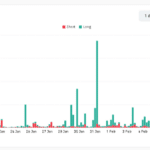By Samuel Shen
SHANGHAI, Dec 4 (Reuters) - Signs of a shift in Chinese foreign exchange policy are boosting business for Shanghai's black market currency traders, as residents of China's commercial capital scramble to buy a strengthening dollar.
"Purchases of the dollar have increased recently," a street dealer who identified himself as Chen Mingwei, dressed in a shabby grey suit, said on Thursday as he loitered outside a Bank of China branch in downtown Shanghai.
"I cannot predict the long-term trend, but the rebound has certainly helped increase our business," Chen said, adding that he had sold $20,000 to each of two clients on Wednesday.
Another black market dealer, whose business card identified him as You Shanjun, said the number of his customers had also risen and he was changing over $20,000 for yuan each day, compared to several thousand dollars in previous weeks.
The Chinese central bank's decision to let the yuan drop to a five-month low against the dollar this week, after four months of stability, convinced currency analysts and interbank traders that China had shifted policy towards moderate yuan depreciation to help its flagging export sector.
Many black market dealers agree with that assessment.
"The yuan has just started depreciating. It could easily fall to 7 early next year," from 6.88 against the dollar on Thursday, said Dong Xuewen, another street trader.
"I suspect the new Obama administration in the U.S. will favour a strong dollar policy," he said. ( Au contraire - AM)
Black market dealers, known as "yellow bulls" in Chinese, are used by customers who want slightly better exchange rates than they can find at banks, or who want to avoid the red tape and restrictions involved in changing money legally at a bank.
Residents of China are legally limited to buying a maximum of $50,000 worth of foreign currency each year.
Chinese residents had $49.75 billion of foreign-currency savings deposits in financial institutions at the end of October, up from $48.56 billion in September, according to data from the central bank.
Deposits fell in the first half of this year when the yuan was appreciating, but have since been edging up. Their 2.5 percent growth in October was the fastest monthly growth rate this year.
Thursday, December 4, 2008
Subscribe to:
Post Comments (Atom)



No comments:
Post a Comment